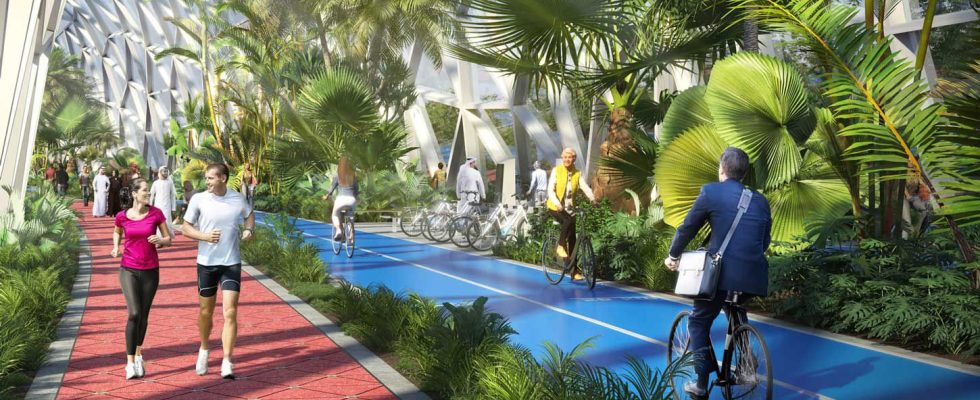After the scandal of air-conditioned stadiums, that of cycle paths? Dubai plans to build an urban road 93 kilometers long… with regulated temperature. Because this road will ban cars and remain dedicated to bicycles and pedestrians. The immense glass and steel structure will look like a caterpillar, especially as it will rest on stilts. The interior, entirely green, will provide walking paths, running paths and lanes reserved for bicycles. Mini-parks, gymnastics stations and small sports fields will pepper the route with the aim of facilitating social interactions and encouraging a healthier lifestyle. Designers even plan to install vertical farms to secure the food supply for residents.
Kinetic paving stones to meet electricity needs
This enormous project in the flagship city of the United Arab Emirates aims to be ecological. Plant irrigation will only use recycled water. Electricity will come from the most abundant energy source on the planet, that of… footsteps: paths, covered with a covering made from recycled pneumatic screeds, will incorporate kinetic paving stones which will move vertically under the weight of the walkers and runners. This movement will produce current which is then routed to generators. Finally, solar panels will complete the system. Called The Loop, “the loop” in French, this green passage will bypass the largest city in the federation of Persian Gulf States. It aims to better connect its 3 million residents, often isolated in their neighborhoods, by allowing them to access their daily needs and destinations in less than twenty minutes on foot or by bike. And each resident will even be rewarded via a dedicated application according to their cycling or walking time. The Loop above all targets a more ambitious objective: to encourage 80% of city dwellers to walk or get into the saddle every day.
The heavy impacts of all-car use on health
In fact, the initiative is part of the urban development plan which aims to improve the quality of life of Dubai residents by 2040. The rapid expansion of the city in recent years has caused significant nuisances: traffic congestion, pollution, noise, insecurity of passers-by… and its corollary of ills, such as cardiovascular diseases, cancers, sleep disturbances or mental health problems. However, the authorities anticipate an increase in the population of 5.8 million over the next seventeen years and do not intend to worsen the situation. They are therefore working to transform Dubai into a “sustainable oasis”. They intend to better protect the environment, devoting two thirds of the country’s surface area to nature reserves and rural areas. They are launching the construction of more ecological housing, increasing the number of tree-lined corridors connecting living and working places and wishing to double the number of green spaces. Without forgetting the inevitable decarbonization of modes of travel.
A challenge for this capital built around the automobile and totally centered on it. However, the emirate is setting up a network of electric trams and buses. It invests in renewable energies to power them and encourages the adoption of rechargeable vehicles through tax reductions and the installation of terminals at their owners’ homes. It is up to the Emirati government, which is undertaking a rapid transition towards smoother mobility, to ensure that this bet does not remain a mirage.
